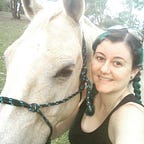ANECDOTE | ANIMAL WELFARE | CONSERVATION
The Joy and Privilege of Doing PhD Fieldwork
Reminiscing on my experiences studying animal-centred volunteer tourism in South and Southeast Asia
I really don’t think I would have finished (or even started!) my PhD if I didn’t have a topic that not only excited and interested me, but allowed me to travel and experience different places and cultures. I was lucky to have a supportive university that funded both my candidature and some of the travel costs associated with my fieldwork, which focused on the ethical potential of volunteer tourism involving animals across South and Southeast Asia.
My research was conducted across three fields: cultural studies, tourism studies and animal studies. By the time I started my PhD I’d already completed a Masters in Cultural Studies focused on ethics and horse training, and has a lot of experience in animal studies before deciding to venture further into this fascinating field. Tourism studies would be a new field for me, and an exciting one!
Volunteering in Thailand, India and Indonesia
After my first trip to Thailand — where I spent a couple of months working first with street dogs then elephants — I developed my main thesis, which was that tourists could help to protect animals and their habitats (including urban sites) by volunteering on ethical animal welfare and conservation projects, such as sanctuaries, rescue centres and reforestation programs. As well as working with dogs and elephants in Thailand, I spent time in India working with street dogs, sacred cows, donkeys and macaque monkeys, and in Bali with sea turtles.
The projects I focused on were ethical in terms of how they treated their animals, used funding, and worked with local communities. For my PhD I mainly studied how tourists engaged with animals and local people alike as a part of welfare and conservation programs often equally focused on improving the lives of animals and community outreach.
I was especially interested in how volunteer tourism projects could draw on existing, culturally specific practices of caring for animals. For example, I was interested in how Theravada Buddhism and Hinduism and the associated tenets of merit-making and ahimsa encouraged people to feed and care for animals. I was also interested in examining how socio-economic status could impact human-animal relationships, and as such the ways in which funding could benefit both animals and local communities.
A mix of fieldwork and theoretical work
The mix of research in the field and back at home at the University of Sydney kept me motivated and inspired. Any time I felt stuck with the more academic parts of the research, I could call upon all my field notes, which helped balance the more cerebral theoretical work with my very practical experiences working with animals.
I often say that I miss doing my PhD, though certainly not the final few months when I felt my brain would explode from the seemingly insurmountable task of actually finishing the thesis! After graduating, my love for fieldwork motivated me to continue conducting research independently that was specifically focused on the welfare and conservation of Thailand’s captive elephants, the topic of my soon to be released book, After the Forests: Thailand’s Captive Elephants and Their People.
Drawing on memories
I’ve been so fortunate to have had so many opportunities to research my passion, but during COVID, I’ve been disconnected from field work. However I’ve loved drawing on my memories of my time travelling and researching overseas.
Reflecting on my past experiences allows me to travel virtually and recollections of sights, sounds and smells take me back to my fieldwork sites and other favourite travel locations. When I close my eyes, I see azure skies and aqua waves lapping the shores of Pemuteran Bali, where I worked on a coral conservation project.
I feel the sensation of my hands on elephant skin at a sanctuary in Mae Taeng, Thailand, and the slimy tip of a trunk caressing my fingers as I feed the animal bananas and sugarcane.
I smell the raw, earthy scent of holy cows at an animal hospital in Udaipur, India, where I helped vets with treatments and fed orphaned calves by hand with huge bottles of fresh milk.
And I hear the rapids of a turgid brown river coursing over rocks at another Thai elephant sanctuary in Mae Chaem, and the sounds of elephants trampling through thick grasses as they roam and forage.
I can’t wait until I can get back to Asia later this year and continue my work with animals. But in the meantime, I’ll keep travelling virtually, with those amazing experiences always in my mind’s eye as I keep writing about animals and the people who care for them around the globe!
______
Dr. Nikki Savvides is an Australian author whose writing focuses on animal advocacy and environmentalism. She’s passionate about improving the welfare and conservation of animals, including captive elephants in Thailand.
Nikki’s book, After the Forests: Thailand’s Captive Elephants and Their People will be released in May 2022. Sign up to her free newsletter for the latest updates.
Check out Nikki’s recent interview on the Zoo Logic podcast with zoologist and conservation educator Dr Grey Stafford, where she discusses her book and associated fieldwork.
You can also stay up-to-date on Nikki’s research and creative projects by following her on Facebook. For more information on Nikki’s research, please visit her website.
